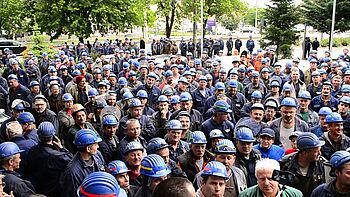In Romania, the European elections come against the background of an upsurge in class struggle that has not been matched, though, by any significant left-wing option at the polls on Sunday.
The past year or so has witnessed a wave of important strikes, mostly in the industrial sector. For example, only this month a wildcat strike erupted at freight wagon factory in Arad (Astra Rail), as Romanian workers spontaneously acted in solidarity with their Indian colleagues whose transport costs from India to Romania were suddenly deducted from their wages. In spite of a ‘yellow’ trade union leader, the strikers went on further, demanding 30-40% wage increases for all workers. Moreover, the strike quickly spread to another factory owned by the same US-based company (Greenbier) in another city, Caracal, with workers making similar demands. While the latter industrial dispute is still ongoing, the workers in Arad ended up accepting only a 15% wage increase over the course of this year, but have already started building a new trade union to truly represent their interests.
It is no coincidence that most of such strikes have occurred in factories owned by big foreign capital, for which Romania has become in recent years a favourite destination due to its low minimum wage (currently less than €450/month, even after repeated slight increases in recent years), low corporate tax (16%) and anti-worker legislation (e.g. only workplaces with at least 15 people are allowed to have a union, although roughly 80% of companies in Romania have less than 15 employees).
However, the economic exodus of millions of workers to Western member states (nearly 4 million over the last couple of decades) has led to a post-1989 low of 3.8% unemployment rate. This has meant that the workers who have remained in the country (out of which about 40% are on minimum wage) have gained more confidence to fight for better wages and working conditions. This has resulted in some notable concessions from employers (e.g. last April workers in a steel factory won 30% wage increase after 21 days of industrial action), but also to an import of cheap labour from non-EU countries such as Vietnam or India, in an obvious attempt to divide workers and undermine their bargaining power. Of course, the latter need to answer back with solidarity and united action, as illustrated by the case of the strike in Arad. But such displays of class solidarity, as splendid as they are, are not enough on their own – trade unions need to actively try and organise foreign workers as well.
As the economic exodus of workers to Western member states (nearly 4 million over recent decades) has led to a post-1989 low of 3.8% unemployment rate, workers who have remained in the country (out of which about 40% are on minimum wage) have gained more confidence to fight for better wages and working conditions.
Unfortunately, this development of class struggle – which can be seen across the entire region – has not yet been reflected politically by the emergence of any significant left alternative that fights for the interests of the working class and the oppressed. All the six parties that, according to the latest poll, are likely to gain seats in the EP are right-wing forces representing various sections of the ruling class (be it foreign or domestic capital):
· the ruling Social Democratic Party (PSD), which, despite the name and its affiliation to the S&D group, is effectively a right-wing populist party in the service of domestic oligarchs and clientelist networks, whose limited social concessions are no longer enough to maintain its previous 40% electoral strength in the light of its attempts to undermine anti-corruption legislation;
· the National Liberal Party (PNL), the main opposition party, affiliated to the PPE group, with a standard neoliberal agenda, utterly detached from the severe social problems that the popular classes are confronted with, but with a good chance to win on Sunday due to PSD’s loss of popularity;
· the coalition between two relatively new centre-right parties, Save Romania Union (USR) and Plus (led by the former EU Commissioner for Agriculture and technocratic Prime Minister Dacian Cioloș), trying to win the votes of the urban middle classes by focusing almost exclusively on the question of corruption and a completely uncritical, almost self-colonising, endorsement of the EU;
· the Alliance of Liberals and Democrats (ALDE), a breakaway from PNL and currently junior partner in the PSD-led governmental coalition – defines itself as a centre-right party as well, being the main political supporter of the import of cheap labour from abroad;
· the Pro-Romania Party of former PSD Prime Minister Victor Ponta, which despite accusing PSD of not being social democratic any longer, declares to be “pro-business” and to stand for “limited state intervention in the economy”;
· the Popular Movement Party of the former right-wing President Traian Basescu, also affiliated to the PPE group, but increasingly irrelevant and struggling to meet the 5% threshold in these elections.
The electoral campaign has been, therefore, out of touch with the day-to-day worries of ordinary Romanians and has centred around the question of corruption. Indeed, more attention has been given to the referendum that President Iohannis called on the same day as the elections, asking voters to agree or not with the recent modifications of the anti-corruption legislation voted by the PSD controlled majority in the parliament. There has virtually been no debate on the wider European issues and even less so on the question of the EU itself.
The only left-wing option on Sunday will be the marginal Romanian Socialist Party (member of the Party of the European Left), which scores so low in the voting intentions that it is not featured in any current poll, despite the fact that its public activity is mostly limited to standing candidates in elections. It has a confused ideological identity, largely rooted in the National Communism of former dictator Ceaușescu, and has no active orientation towards the working class or the youth. By and large, the party is an empty shell, despite a handful of members full of good intentions.
The new left reformist party Demos (Romania’s answer to Razem) has several good concrete demands but a largely uncritical, naïve support for the EU and equally naïve illusions in reforming capitalism along neo-Keynesian lines (the more naïve in a peripheral country such as Romania). In any case, the new formation failed to gather the staggeringly high number of 200,000 signatures required for participating in national elections, which is why it would have perhaps made more sense for them to put forward an independent candidate (which requires “only” 100,000 signatures) and focus on building her/his profile, as in the case of trade unionist Vanya Grigorova in Bulgaria.
Fortunately, the long-standing absence of a far right electoral force in Romania remains true for these elections too, partly because almost all mainstream parties display more or less strident shades of nationalism. But for how long? A likely new economic crisis at a European scale would provide new opportunities for such a force to develop as long as there is no significant left alternative to capture people’s disillusionment with mainstream politics. Such a left alternative needs to develop sooner rather than later, and the labour movement, galvanised and pushed into action by bottom-up pressure, could and should play a central role in that, to create a new mass party representing the interests of working people and the oppressed.
Cover photo source: YouTube channel Arad Online



